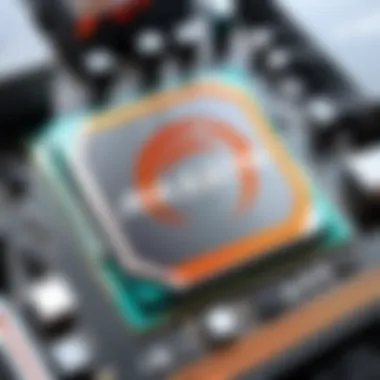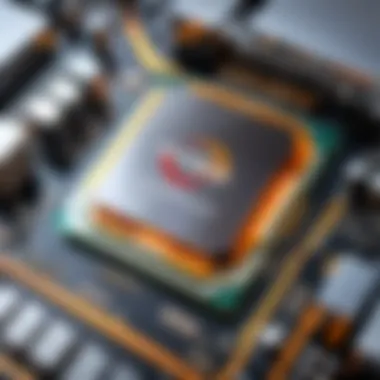Unveiling the Evolution of All Ryzen Processors: A Detailed Insight


Esports Coverage
Modern processors Evolution begins in the intense realm of esports competitions. These CPUs play a crucial role in enhancing performance for pro-gaming tournaments, where milliseconds can be the difference between victory and defeat. By diving deep into player profiles and conducting insightful interviews, we gain a profound understanding of how Ryzen processors empower the gaming community. Furthermore, elucidating team strategies and providing in-depth analysis shed light on how AMD's processors influence competitive gameplay across various titles.
Hardware Testing
Game Reviews
The evolution of Ryzen processors intertwines with the evolution of gaming experiences. By immersing in the latest game releases, we witness firsthand how Ryzen's capabilities align with cutting-edge gameplay technologies. Conduct detailed gameplay analyses to dissect how Ryzen processors contribute to smooth frame rates and seamless gaming performance. Evaluate storyline compositions and graphic intricacies to illustrate how Ryzen's processing power enriches the visual and narrative aspects of modern gaming titles.
Introduction
In the realm of processor evolution, understanding the trajectory of Ryzen processors is crucial for tech aficionados and gamers. For those immersed in the intricate world of technology, comprehending how Ryzen processors have evolved over time is akin to unlocking a treasure trove of performance advancements and innovative features. The \
Understanding Ryzen Processors
Ryzen processors are a pivotal component in the realm of computer technology, particularly for gaming and professional use. Understanding the intricacies of Ryzen processors is crucial in order to grasp their full potential and capabilities. By diving into the specifics of Ryzen processors, individuals can enhance their knowledge of how these processors operate and what sets them apart from other options in the market. Analyzing the architecture and design of Ryzen processors provides insight into their performance and efficiency, making it easier for users to determine which processor best suits their needs and requirements.
The Birth of Ryzen


The inception of Ryzen marked a significant milestone in the world of CPUs. In 2017, AMD introduced its Ryzen line of processors, challenging the dominance of Intel in the market. Ryzen processors were lauded for their impressive multi-core performance, offering users a cost-effective alternative without compromising on speed or reliability. The arrival of Ryzen not only increased competition in the CPU sector but also spurred innovation and technological advancements, driving the industry towards higher efficiency and better performance.
Key Features of Ryzen Processors
Ryzen processors boast a myriad of features that set them apart from traditional CPU models. One of the key highlights of Ryzen processors is their multithreading capability, allowing for smoother multitasking and enhanced productivity. Additionally, Ryzen processors are known for their overclocking potential, enabling users to push the performance limits beyond standard specifications. The inclusion of Sense MI technology further optimizes the overall user experience by adapting to individual workloads and enhancing efficiency based on usage patterns.
Ryzen Architecture Explained
The architecture of Ryzen processors is designed with precision and optimization in mind. The Zen microarchitecture, which forms the foundation of Ryzen processors, emphasizes performance per watt, ensuring that users can experience top-tier speed without excessive power consumption. The Infinity Fabric interconnects various components within the processor, facilitating seamless communication and data transfer. The meticulous design and layout of Ryzen architecture contribute to its robust performance and reliability, making it a preferred choice for both gaming enthusiasts and professionals who demand high-quality computing power.
Evolution of Ryzen Processors
The Evolution of Ryzen Processors stands at the core of this enlightening article, offering readers a profound insight into the development path of these cutting-edge processors by AMD. Understanding the Evolution of Ryzen Processors is crucial for tech enthusiasts and gamers, as it unravels the progression of performance improvements, feature enhancements, and architectural advancements that have shaped the Ryzen series over the years. Dive into the nuanced details of how each generation has built upon its predecessor to deliver unrivaled computing power and meet the ever-evolving demands of modern applications and games.
First Generation Ryzen Processors
The advent of the First Generation Ryzen Processors marked a significant milestone in the realm of consumer CPUs, introducing a new era of competition and innovation in the market. With a focus on delivering high core counts, improved IPC, and competitive pricing, these processors challenged the status quo and redefined performance benchmarks. Enthusiasts were thrilled by the overclocking potential and multi-threaded capabilities of these chips, setting a solid foundation for future iterations in the Ryzen lineup.
Second Generation Ryzen Processors


The Second Generation Ryzen Processors further solidified AMD's position as a formidable player in the CPU landscape, integrating refined Zen+ architecture to boost performance and efficiency. Building upon the success of their predecessors, these processors showcased enhanced clock speeds, lower latencies, and advanced Precision Boost technology, catering to both gamers and content creators. The introduction of APUs with integrated Vega graphics offered a compelling solution for users seeking combined CPU and GPU performance in a single package.
Third Generation Ryzen Processors
Enter the Third Generation Ryzen Processors, a game-changer in terms of productivity and gaming supremacy. Featuring the groundbreaking Zen 2 architecture on the 7nm process node, these processors delivered unprecedented compute power and efficiency. With higher core counts, improved IPC, and PCIe 4.0 support, this generation redefined the boundaries of performance, laying the groundwork for immersive gaming experiences and seamless multitasking. The Ryzen 3000 series became a go-to choice for enthusiasts seeking unparalleled value and raw processing prowess.
Fourth Generation Ryzen Processors
The latest iteration in the Ryzen lineup, the Fourth Generation Ryzen Processors, continues to push the boundaries of performance and innovation. Utilizing the Zen 3 architecture, these processors excel in single-core performance, delivering exceptional gaming fluidity and responsiveness. With advanced technologies such as Infinity Fabric and unified L3 cache, the Ryzen 5000 series represents the pinnacle of AMD's engineering prowess, catering to the demands of competitive gamers and professionals alike. The seamless integration of hardware and software optimizations ensures a superior user experience across a wide range of applications and workloads.
Performance and Benchmarks
In the realm of technology and hardware, performance plays a pivotal role in determining the efficiency and capability of a processor. When it comes to Ryzen processors, a thorough assessment of their performance and benchmarks is essential for tech enthusiasts and gamers. By analyzing the benchmark scores and real-world performance metrics of Ryzen processors, users can gauge their processing power and determine their suitability for various tasks.
Furthermore, understanding the nuances of performance benchmarks allows users to make informed decisions when selecting a Ryzen processor for their specific needs. The comparison of benchmarks between different Ryzen models helps in identifying the strengths and weaknesses of each processor, enabling users to choose the most suitable option for their requirements.
The significance of performance and benchmarks in this article lies in providing readers with a comprehensive overview of the capabilities of Ryzen processors. By delving into the intricate details of benchmarking results and performance evaluations, readers can gain valuable insights into the performance trends across different Ryzen generations and make informed decisions when considering a processor upgrade or purchase.
Comparative Analysis of Ryzen Processors


The comparative analysis of Ryzen processors is a crucial component of understanding the evolution and advancements in AMD's processor lineup. By comparing the specifications, performance metrics, and features of different Ryzen processor generations, users can gain a nuanced understanding of the improvements and innovations introduced with each new iteration.
When conducting a comparative analysis of Ryzen processors, key factors such as clock speed, core count, cache size, and architectural enhancements are taken into consideration to evaluate the overall performance of each processor. Additionally, benchmarks and real-world performance tests are essential in facilitating a side-by-side comparison of Ryzen processors across various metrics.
Through a detailed comparative analysis, readers can grasp the evolutionary journey of Ryzen processors, from their inception to the latest fourth-generation models. By examining the performance improvements, architectural changes, and feature enhancements of each Ryzen generation, readers can appreciate the technological advancements that have shaped AMD's processor offerings over the years.
Overclocking Potential
When delving into the realm of Ryzen processors, one cannot overlook the crucial aspect of overclocking potential. Overclocking, a practice highly valued by tech enthusiasts and gamers, involves running hardware components at higher speeds than originally intended. It is not just a tweak for boosting performance but a meticulous process requiring a deep understanding of hardware intricacies. Overclocking Potential proves to be a significant factor in this article as it directly impacts the capabilities and possibilities offered by Ryzen processors, making it a focal point in the realm of gaming and tech optimization.
One of the key elements to consider regarding Overclocking Potential is the performance boost it can deliver. By pushing the processor beyond its factory settings, users can unlock additional processing power, which translates into improved speed and efficiency. However, this increased performance comes with a caveat; overclocking may lead to higher power consumption and increased heat generation. Achieving the perfect balance between performance gains and system stability is paramount.
Moreover, the benefits of exploring Overclocking Potential extend beyond immediate performance enhancements. It presents an opportunity for enthusiasts to fine-tune their systems according to their specific needs and preferences. The ability to tweak clock speeds and voltages allows for personalized optimization, catering to diverse usage scenarios ranging from gaming to content creation.
When delving into overclocking, it is imperative to consider the potential risks and drawbacks associated with this practice. Overclocking puts additional stress on the processor and other components, potentially reducing their lifespan if not done properly. It also voids warranties in most cases, shifting the responsibility of system stability solely onto the user. Understanding these considerations is crucial for making informed decisions regarding Overclocking Potential with Ryzen processors.
In essence, the exploration of Overclocking Potential adds a layer of depth and customization to the Ryzen experience. It empowers users to extract the maximum performance from their hardware, albeit with caution and knowledge. As we navigate through the evolution of Ryzen processors, understanding and harnessing overclocking capabilities emerge as key pillars in optimizing performance and embracing the full potential of these powerful processors.
Innovations and Future Prospects
In the realm of Ryzen processors, the discussion about innovations and future prospects is paramount. Understanding the trajectory of technological advancements and potential developments in processor design is crucial for staying ahead in the competitive landscape of tech. With new innovations constantly reshaping the industry, keeping abreast of potential future prospects can provide a strategic advantage for tech enthusiasts and gamers. Exploring upcoming advancements can unlock fresh possibilities for enhanced performance, efficiency, and overall user experience.
Upcoming Ryzen Processor Models
The anticipation surrounding upcoming Ryzen processor models is palpable within the tech community. As technology continues to evolve rapidly, the release of new processor models sparks excitement and speculation among consumers. The upcoming Ryzen processor models are expected to push the boundaries of performance and efficiency, incorporating cutting-edge features and advancements. Tech aficionados eagerly await the unveiling of these new models, anticipating improvements in speed, multitasking capabilities, and overall computing prowess. Stay tuned for the latest updates on the upcoming Ryzen processor models, as they are poised to redefine the benchmarks for processor excellence.



